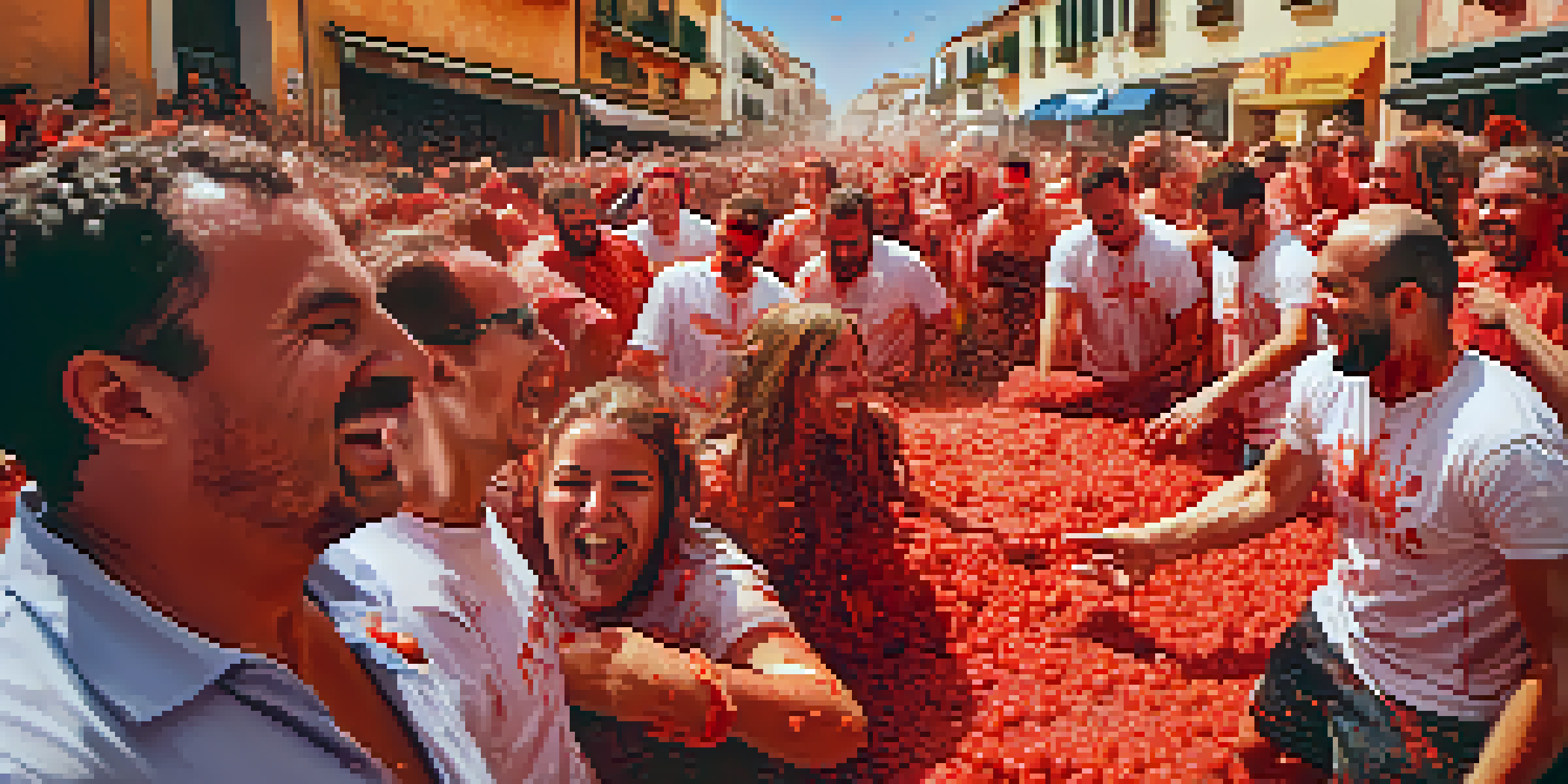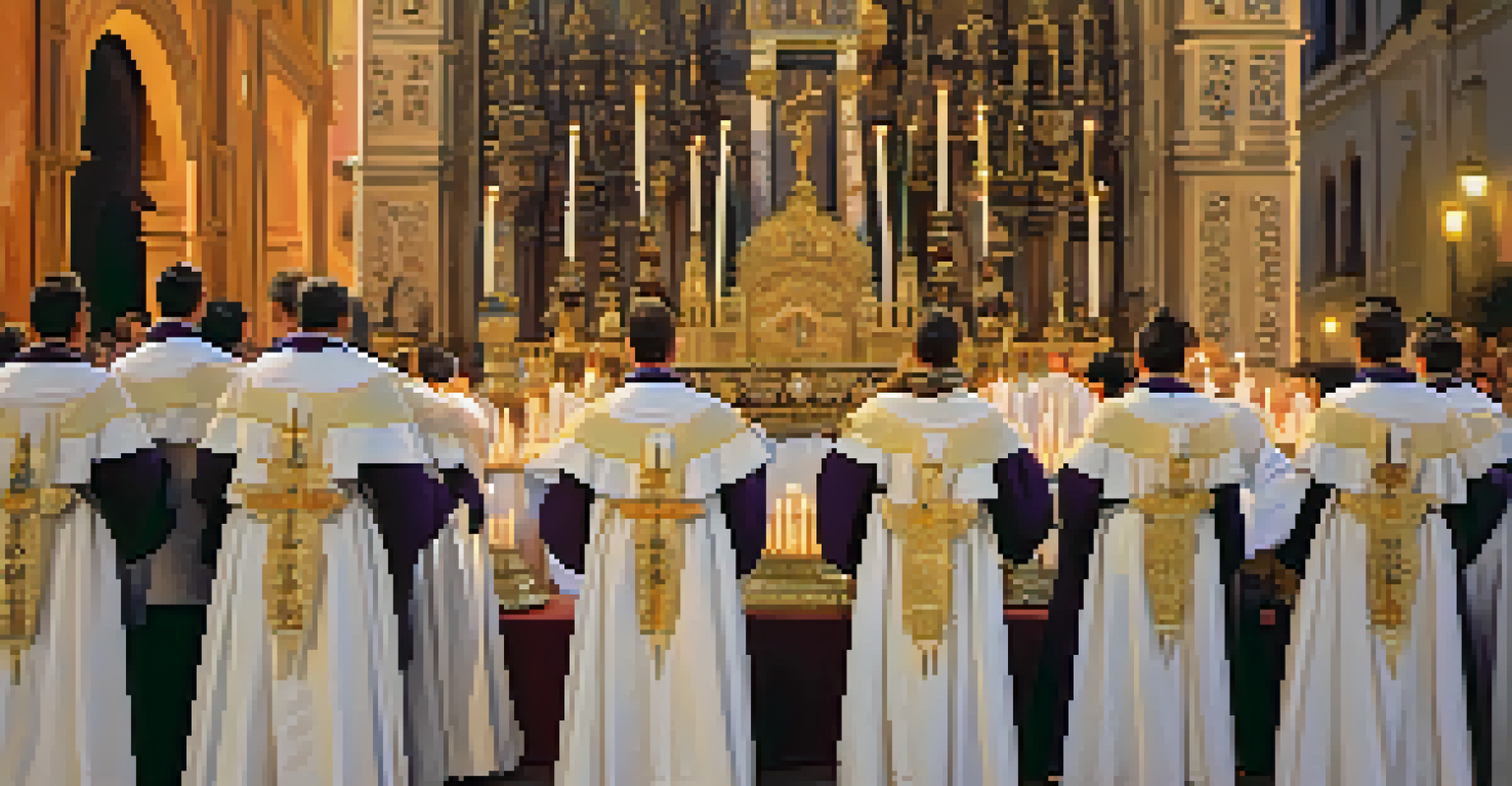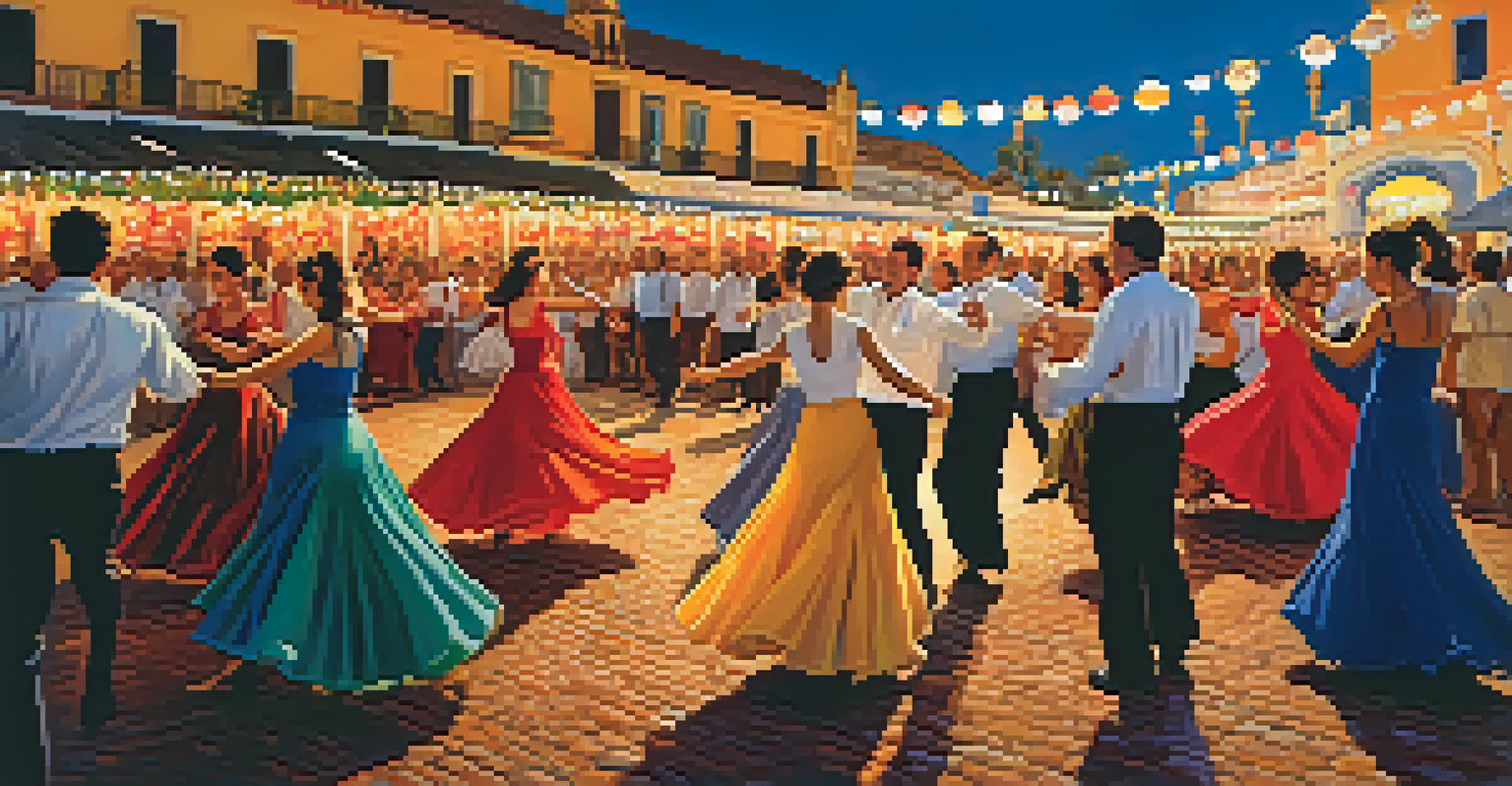Festivals and Traditions: A Look at Spanish Cultural Events

The Colorful Celebration of La Tomatina in Buñol
La Tomatina is one of Spain's most iconic festivals, held annually in Buñol. Participants engage in a massive tomato fight, resulting in a sea of red pulp and laughter. This quirky celebration attracts thousands of locals and tourists alike, all eager to experience the joyous chaos.
Festivals are a time for reconnecting with family and friends, strengthening bonds that last a lifetime.
Originally started in 1945 during a local parade, the festival has evolved into a world-renowned event. It showcases a spirit of fun and camaraderie, as people from different backgrounds come together to throw tomatoes at one another. The event emphasizes the importance of play and community in Spanish culture.
As you wander through the streets of Buñol during La Tomatina, you'll witness the vibrant energy that defines Spanish festivals. The laughter, the splashes of tomato juice, and the friendly faces all contribute to an unforgettable experience. It's a reminder that sometimes, letting loose and having fun is what brings us together.
Embracing Tradition: Semana Santa in Seville
Semana Santa, or Holy Week, is a deeply rooted tradition in Seville that captivates both locals and visitors. This week-long celebration features solemn processions, elaborate floats, and participants dressed in traditional robes, showcasing Spain's rich religious heritage. The atmosphere is a blend of reverence and artistry.

Each procession is an awe-inspiring display of devotion, with intricate pasos (floats) adorned with religious icons. The sound of drums and the fragrance of incense fill the air, creating a poignant ambiance. It's a time for reflection, faith, and community, as families come together to honor their traditions.
Festivals Unite Communities in Spain
Spanish festivals foster a sense of belonging and bring people together, celebrating shared cultural heritage.
Experiencing Semana Santa is like stepping into a living painting, where every detail tells a story of devotion and cultural pride. The passion evident in the participants' faces and the electric energy of the crowds remind us of the strength found in tradition. It's a celebration that resonates with the heart and soul of Spain.
The Joyful Spirit of Feria de Abril in Seville
Feria de Abril, or April Fair, is a week-long festival that bursts with color, music, and dance in Seville. After the solemnity of Semana Santa, this joyous celebration transforms the city into a vibrant tapestry of flamenco dresses and lively casetas (tents). It's a time when tradition and revelry come together beautifully.
Tradition is not the worship of ashes, but the preservation of fire.
The fair features a variety of activities, including horse parades, traditional music, and, of course, plenty of delicious food and drink. Locals and tourists alike enjoy tapas, sherry, and the infectious rhythms of flamenco. The atmosphere is electric, encouraging everyone to dance and celebrate life.
Feria de Abril serves as a perfect example of how Spanish culture embraces both its roots and its love for festivities. It's not just a fair; it's a way for the community to come together, celebrate their heritage, and create lasting memories. This festival encapsulates the essence of joy and togetherness in Spain.
Exploring the Unique Traditions of San Fermín in Pamplona
San Fermín is perhaps best known internationally for its thrilling running of the bulls, held in Pamplona each July. This festival combines tradition, adrenaline, and a sense of community, drawing crowds from around the globe. The excitement builds as participants don their signature white outfits with red scarves.
The event kicks off with the famous 'Chupinazo,' a rocket launch that signals the start of the festivities. For the next week, the city is alive with music, dancing, and traditional events, culminating in the infamous bull runs. While it may seem daunting, the atmosphere is filled with camaraderie and shared excitement.
Traditions Passed Through Celebrations
Festivals serve as a vital means of preserving cultural identities, ensuring traditions are handed down through generations.
San Fermín highlights how cultural events can unite people through shared experiences, whether it's the thrill of the run or the joy of dancing in the streets. The festival reflects the vibrant spirit of the Spanish people, showcasing their love for life and celebration. It's a unique blend of thrill and tradition that leaves a lasting impression.
The Enchanting Night of San Juan Celebrations
San Juan is celebrated on the night of June 23rd, marking the summer solstice with bonfires and beach parties across Spain. This festival, steeped in ancient traditions, symbolizes purification and renewal. People gather around roaring fires, jumping over flames to cleanse themselves of past misfortunes and embrace new beginnings.
The lively atmosphere is enhanced by music, dancing, and the salty sea breeze. It’s a night filled with laughter, as friends and families celebrate together with delicious food and drink. The sight of fireworks lighting up the night sky adds an extra layer of magic to the evening.
San Juan serves as a reminder of the power of community and the joy of embracing the summer season. Whether you're by the beach or in the heart of a city, the spirit of celebration is palpable. It’s a festival that encourages everyone to let go of their worries and revel in life’s simple pleasures.
Cultural Richness in the Festivities of Día de los Muertos
Día de los Muertos, or Day of the Dead, is a heartfelt celebration that honors deceased loved ones. While often associated with Mexico, this tradition is also embraced in various regions of Spain, showcasing a beautiful blend of remembrance and festivity. Families create altars adorned with flowers, photos, and favorite foods of the departed.
The atmosphere is filled with color and life, as people come together to celebrate the memories of those they've lost. Parades, music, and vibrant decorations transform public spaces, making it a joyous occasion rather than a somber one. This festival highlights the importance of family and heritage in Spanish culture.
Joy and Resilience in Spanish Culture
The vibrant energy of festivals reflects the joy and resilience of the Spanish people, celebrating life despite differences.
Día de los Muertos exemplifies how traditions can evolve and adapt, bringing communities together in unique ways. It’s a celebration of life, love, and remembrance, reminding us that while our loved ones may be gone, their spirits continue to live on in our hearts. It’s a beautiful testament to the enduring bonds of family and culture.
The Festive Spirit of Carnival Celebrations Across Spain
Carnival is celebrated with exuberance throughout Spain, with each region adding its unique flair. From the extravagant costumes of Cádiz to the vibrant parades of Tenerife, this festival is a true spectacle of creativity and joy. Carnival marks a time of indulgence before the solemnity of Lent, allowing people to let loose and embrace the festive spirit.
Throughout the festivities, you'll find lively music, dance, and plenty of delicious treats. People come together in a colorful display of camaraderie, where laughter and joy reign supreme. The atmosphere is infectious, inviting everyone to join in the celebration, regardless of age or background.

Carnival highlights the importance of community and the joy of shared experiences in Spanish culture. It's a time when everyone can express themselves freely and celebrate life in all its forms. The creativity and passion displayed during Carnival remind us of the beauty of cultural diversity and the joy of coming together.
The Importance of Festivals in Spanish Community Life
Festivals in Spain are more than just events; they are essential threads that weave together the fabric of community life. They foster a sense of belonging, allowing people to come together, celebrate, and share in their cultural heritage. These gatherings are a time for reconnecting with family and friends, strengthening bonds that last a lifetime.
Through festivals, traditions are passed down from generation to generation, ensuring that cultural identities are preserved. The stories, music, and rituals associated with these events create a rich tapestry that reflects the diverse history of Spain. It's a beautiful way to honor the past while embracing the future.
In essence, Spanish festivals embody the spirit of joy, resilience, and unity. They remind us that, regardless of our differences, we can all come together to celebrate life. The vibrant energy of these cultural events enriches the community and ensures that the heart of Spain beats strong.